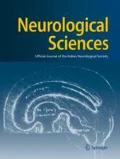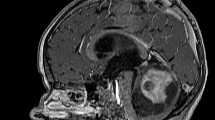Abstract
The authors describe a patient who suffered two successive, right and left, strokes that caused bilateral rolandic operculum damage. The clinical picture was characterized by selective impairment of volitional facio-pharyngo-glosso-masticatory movements with sparing of automatic and reflex motor activity (Foix-Chavany-Marie syndrome). Though completely speechless, the patient was not aphasic. This dissociation is discussed in the light of the peculiar localization of lesions evidenced by CT-scan.
Sommario
Viene descritta una paziente portatrice di due lesioni ischemiche coinvolgenti l'opercolo rolandico in entrambi gli emisferi. Il quadro clinico era caratterizzato da una compromissione selettiva dei movimenti volontari (con integrità di quelli automatici e riflessi) bilateralmente a livello facio-faringo-glosso-masticatorio (sindrome di Foix-Chavany-Marie). La paziente, del tutto incapace di articolazione e fonazione, non risultava afasica ad una valutazione neuropsicologica.
Questa dissociazione viene discussa in riferimento alla particolare localizzazione delle lesioni alla T.A.C. cerebrale.
Similar content being viewed by others
References
Alajouanine T. andThurel R.:La diplégie faciale cérébrale, forme corticale de la paralysie pseudobulbaire. (Contribution à l'étude de la dissociation des activités volontaires et réflexes). Rev. Neurol. 40: 441–458, 1933.
Bruyn G.W. andGathier J.C.:The operculum syndrome. In: Vinken, P.J. and Bruyn, G.W. (eds.): Handbook of clinical neurology, Amsterdam, North Holland, 1969.
Château R., Fau R., Groslambert R., Perret J., Boucharlat J. andChâtelain R.:A propos de trois observations de diplégie linguo-facio-masticatrice d'origine corticale: la forme de l'adulte et celle de l'enfant. Rev. Neurol. 114: 390–395, 1966.
Ferrari G., Boninsegna C. andBeltramello A.:Foix-Chavany syndrome: CT study and clinical report of three cases. Neuroradiology 18: 41–42, 1979.
Foix C., Chavany J.A. andMarie J.:Diplégie facio-linguo-masticatrice d'origine cortico-souscortical sans paralysie des membres. Rev. Neurol., 33: 214–219, 1926.
Levine D.N. andMohr J.P.:Language after bilateral cerebral infarctions: role of the minor hemisphere in speech. Neurology, 29: 927–938, 1979.
Ludwig M.E.:Beitrag zur Frage der Bedeutung der Unterwerigen Hemisphäre. Z. Gesamte Neurol. Psychiat. 164: 735–747, 1939.
Magnus A.:Fall von Aufhebung des Willenseinflussen auf einige Hirnnerven. Müllers Arch. Anat. Physiol. Wissensch. Med., 258–266, 1837.
Mariani C., Spinnler H., Sterzi R. andVallar G.:Bilateral perisylvian softenings: bilateral anterior opercular syndrome (Foix-Chavany-Marie syndrome). J. Neurol., 223: 269–284, 1980.
Mohr J.P., Pessin M.S., Finkelstein S., Funkenstein H.H., Duncan G.W., andDavis K.R.:Broca aphasia: pathologic and clinical. Neurology 28: 311–324, 1978.
Schott B., Boulliat G., Cotte L., andVauterin C.:Le syndrome operculaire bilatéral et unilatéral. Lyon Med. 206: 365–378, 1961.
Tonkonogy J. andGoodglass H.:Language function, foot of the third frontal gyrus and Rolandic operculum. Arch. Neurol. 38: 486–490, 1981.
Author information
Authors and Affiliations
Rights and permissions
About this article
Cite this article
Villa, G., Caltagirone, C. Speech suppression without aphasia after bilateral perisylvian softenings (bilateral rolandic operculum damage). Ital J Neuro Sci 5, 77–83 (1984). https://doi.org/10.1007/BF02043975
Issue Date:
DOI: https://doi.org/10.1007/BF02043975




